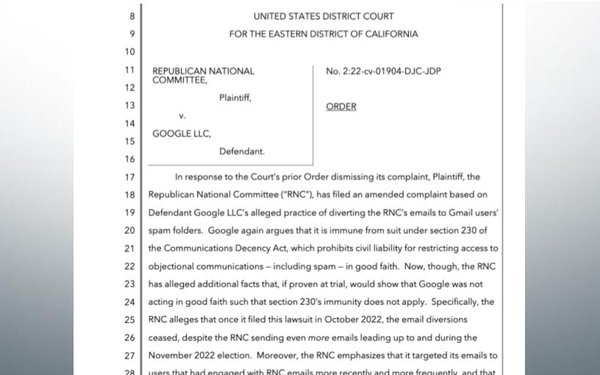
The Republican National Committee is urging a
federal appellate court to reinstate claims that in 2022 Google wrongly sent fundraising messages into Gmail users' spam filters.
“This case is about the market-dominant communications
firm’s unlawful discrimination against the Republican National Committee because of the RNC’s political affiliation,” the organization writes in papers filed this week with the 9th
Circuit Court of Appeals.
The group's argument comes in a dispute that dates to October 2022, when the political organization sued Google for allegedly disproportionately designating
Republican fundraising messages as spam. The complaint referred to a North Carolina State University study that found Gmail flags around 68% of Republican campaign emails as spam, compared to 8%
Democratic campaign emails. (The organization says the “mass relegation” of its emails to Gmail spam folders stopped in October 2022, after it filed suit.)
advertisement
advertisement
The political
organization's complaint included claims that Google violated California's common carrier law (which prohibits telecommunications companies from discriminating when transmitting messages), a state
civil rights law that prohibits discrimination, an unfair competition law, and that the company wrongly interfered with potential economic relationships.
Google denied filtering emails for
political reasons, arguing that its anti-spam technology aims to make the product better for users -- and doesn't filter mail for political or partisan purposes.
In 2023, U.S. District Court
Judge Daniel Calabretta in the Eastern District of California dismissed the political group's discrimination claims, and claims relating to common carriage. The following year, Calabretta dismissed
the remaining claims.
He said in the ruling issued in 2023 that California's civil rights law doesn't cover discrimination based on political affiliation, and that email providers like Google
aren't considered common carriers in California.
“No court, much less a court interpreting California’s common carrier law, has found an email service provider to be a common
carrier. This court declines to be the first,” he wrote.
Last year, Calabretta dismissed claims that Google violated an unfair competition law, and that the company wrongly interfered
with potential economic relationships.
The political organization is now asking the 9th Circuit to revive all claims.
Among other arguments, the organization says California's civil
rights law, the Unruh Act, should be interpreted as banning discrimination based on political affiliation, and that Google should be treated as a common carrier, comparable to a telephone company.
The Republican committee is likely facing an uphill battle with those arguments, according to Santa Clara University professor Eric Goldman.
“It's clear that they're trying to break
new ground,” Goldman tells MediaPost.
The text of the Unruh Act prohibits discrimination based on a host of factors -- including sex, race, color, religion, ancestry, national
origin, disability, marital status, sexual orientation -- but doesn't specifically mention political affiliation.
For its part, the Republican political group argues in its papers that the
statute aims to prohibit discrimination broadly, and that the factors specifically listed in the text of the law are only illustrative.
“Discrimination based on political affiliation is
harmful; it’s discrimination based on a personal characteristic fundamental to a person’s identity,” the organization writes. “Recognizing claims against political-affiliation
discrimination compensates victims and deters future discrimination.”
The organization also claims that Google should be treated as a common carrier, writing that email providers like
Gmail “offer themselves to the public as conduits for sending and receiving messages, just like the telephone and postal mail, both of which are common carriers.”